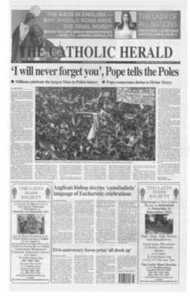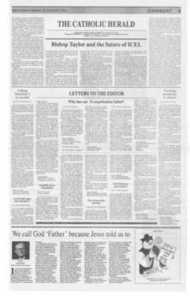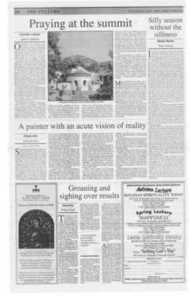Page 5, 23rd August 2002
Page 5

Report an error
Noticed an error on this page?If you've noticed an error in this article please click here to report it.
Tags
Share
Related articles
2002 A Testing Year Sm 41 Caldwell And Luke Coppen Conclude
Maximilian Kolbe : The Model Priest
They Are The Best Of Men — Hardworking, Uncomplaining, Holy,
British Priest Celebrates Historic Mass In St Peter's...
Polish Archbishop Resigns Over Allegations
Pope inspires Poles to rise to the challenge of freedom
BY LUKE COPPEN Four new blesseds for Poland
i=1 Fr John Adalbert Balicki was a model priest who offered spiritual direction to thousands of priests and lay people.He was ordained priest in 1892, at the age of 23, and quickly became known as a skilled confessor and gifted preacher. From 1897 to 1934, he worked in a seminary in Przemysl in eastern Poland, first as a professor as dogmatic theology, later as vice-rector. After resigning from the seminary due to ill health, he spent the remainder of his life hearing confessions and offering spiritual guidance. He died of pneumonia and tuberculosis in 1948.
0 Polish Jesuit priest John Beyzym is known as the "apostle of the lepers" of Madagascar. He arrived on the East African island in 1898, at the age of 48, and served the country's lepers until his death in October 1912. Fr Beyzym found the leprosarium of Ambahivoraka, near the capital Antananarivo, in a squalid state with lepers often dying of hunger rather than of sickness. In 1911, after eight years of energetic fundraising, he opened a modern hospital for lepers at Marana near Fianarantsoa.
❑ Archbishop Sigmund Felix Felinski is venerated for his 20-year ministry to Poles exiled in Siberia. A highly cultured man, who studied French literature at the Sorbonne, he founded the Congregation of the Franciscan Sisters of the Family of Mary in 1857 — a mere two years after his ordination. In 1862 he was consecrated Archbishop of Warsaw, which was then in the hands of the Russian army. After writing a letter to the Russian emperor protesting against the harsh repression of the "January Revolt" of 1863, he was deported to Siberia. Despite severe restrictions, he served his fellow Polish exiles and even built a Catholic church. After negotiations between Russia and the Holy See, he was freed in 1883 and spent the last 12 years of his life in south eastern Galicia. He died in Krakow in September 1895.
ij Sister Santia Szymkowiak was known as the "angel of goodness" by the French and English prisoners whom she served in the Second World War. Born in 1910 to a well-to-do family, she joined the Congregation of the Daughters of Our Lady of Sorrows (the "Seraphic Sisters") after a life-changing pilgrimage to Lourdes. In 1939, after the German invasion of Poland, Sr Santia's convent was occupied by the Nazis and the nuns placed under house arrest. She was subjected to forced labour, but ministered in her free time to French and English prisoners of war. In July 1942 she took her solemn vows. She died a little more than a month later from tuberculosis. POLAND'S Catholics were settling back into everyday life this week after accompanying Pope John Paul II on an remarkable three-day journey honouring the nation's faith and history.
On his ninth, and possibly final, pilgrimage to his homeland, John Paul drew on Poland's past to outline his vision of the country's future. During his early visits, he had appealed to his countrymen to shake off the yoke of communism. On this trip, he urged them to place their hard-won freedom at the service of others.
On Sunday, he held up four figures who had risen to this challenge in an extraordinary way. He said that the four Catholics Archbishop Sigismund Felix Felinski, Fr Jan Beyzym, Fr Jan Balicki and Sr Santia Janina Szymkowiak — were "stupendous examples" of individuals who devoted their lives to the service of God and man. At a beatification Mass in Krakow's Blonie Park, the Pope said all four Poles were "united" by their devotion to the Divine Mercy, the key theme of the Pontiff's pilgrimage.
The Pope said he hoped the four new beati would inspire Poles to combat "the modern forms of poverty" that scarred Poland more than a decade after the collapse of communism.
"What is needed today," the Pope said, "is a new creativity in charity, in a spirit of solidarity towards our neighbour, so that the help we lend will be a witness of sharing between brothers and sisters. May this creativity never be lacking in the residents of Krakow and in all the people of our homeland. It represents the pastoral plan of the Church in Poland.
"Today, with all my strength, I beseech the sons and daughters of the Church, and all people of good will: never, ever separate 'the cause of man' from the love of God. Help modem men and women to experience God's merciful love! This love, in its splendour and warmth, will save humanity!"
The Pope drew a prolonged round of applause when he said he hoped to return one day to his native land.
"God bless you," he said to the vast throng filling the park. "I would like to add 'until next time', but this is entirely in God's hands."
The crowd shouted back: "You are great. We love you. Stay with us.".
"Lovely, lovely, you are telling me to desert Rome!" the Pope responded, with tears in his eyes.
John Paul added to his vision of Poland's future in his last speech at the end of his emotional three-day visit. Praising the country's "successes and courageous undertakings" since the fall of communism, he expressed support for Poland's membership of the European Union, but decried the social and economic cost of change.
"With a certain preoccupation, I have spoken of the difficulties and the cost of the changes that weigh upon the neediest and the weakest, on the unemployed, the homeless and those who are forced to live in increasingly difficult conditions and with uncertainty concerning the future.
"As I take my leave, I wish to entrust all these difficult situations
in our native land to God's Providence and I encourage all those who exercise responsibility in the running of the State to be mindful of the good of the Republic and of its citizens. May the spirit of mercy, of fraternal solidarity, of concord in authentic concern for our homeland reign among you. I do hope that by cherishing those values the Polish nation, which has belonged to Europe for centuries, will find its due place in the structures of the European Union and not only will not lose its own identity, but will enrich this continent and the whole world with this tradition."
The Pope's final speech at Krakow airport was marked by emotional scenes as young Poles urged the Pontiff to return to the country. As the young people chanted "Zapraszamy" — "We invite you back" — the Pope said: "Taking leave of Poland, I wish to bid you all farewell, dear compatriots. Many have waited for my coming. Many have wished to meet me, although not all were able to do so. Maybe next time ..."
Before leaving, the Pope celebrated Mass at the sanctuary of Our Lady of Angels at Kalwaria Zebrzydowska, founded 400 years ago. He recalled his frequent visits there as a boy with his father after the death of his mother, and later as Archbishop of Krakow.
He told the audience that he had prayed to the Virgin Mary to "obtain for me strength in body and spirit so that I may carry out to the end the mission given to me by the Risen Lord".
At the Church of St Florian in Krakow, where he had worked as a university chaplain after the Second World War, he asked Polish Catholics to pray for him "both when I am alive and after I die".
Both the Pope and Poland's faithful seemed to draw new hope and energy from the Pontiff's visit. Elzbieta Krawczykiewicz, a retired pharmacist, said: "This visit is sure to give him new strength because it's his beloved Krakow and because it's Poland."
blog comments powered by Disqus















